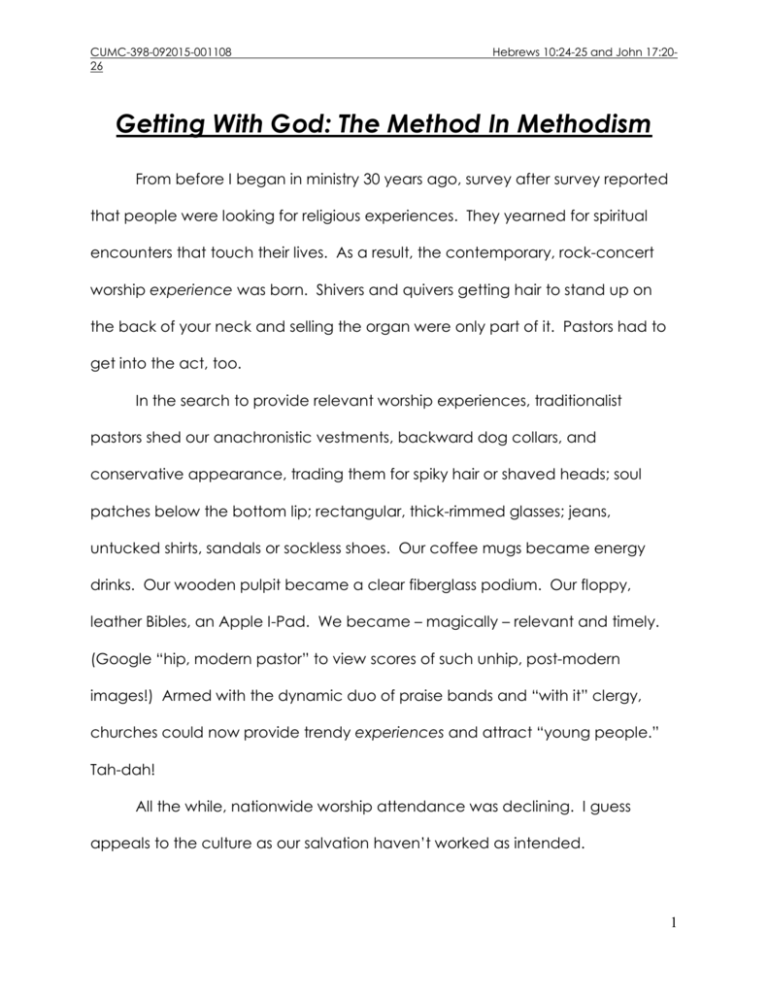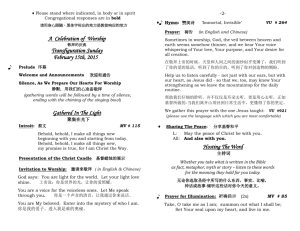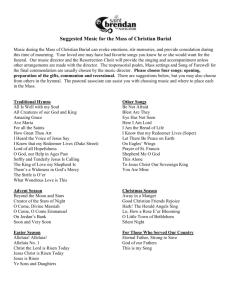
CUMC-398-092015-001108
26
Hebrews 10:24-25 and John 17:20-
Getting With God: The Method In Methodism
From before I began in ministry 30 years ago, survey after survey reported
that people were looking for religious experiences. They yearned for spiritual
encounters that touch their lives. As a result, the contemporary, rock-concert
worship experience was born. Shivers and quivers getting hair to stand up on
the back of your neck and selling the organ were only part of it. Pastors had to
get into the act, too.
In the search to provide relevant worship experiences, traditionalist
pastors shed our anachronistic vestments, backward dog collars, and
conservative appearance, trading them for spiky hair or shaved heads; soul
patches below the bottom lip; rectangular, thick-rimmed glasses; jeans,
untucked shirts, sandals or sockless shoes. Our coffee mugs became energy
drinks. Our wooden pulpit became a clear fiberglass podium. Our floppy,
leather Bibles, an Apple I-Pad. We became – magically – relevant and timely.
(Google “hip, modern pastor” to view scores of such unhip, post-modern
images!) Armed with the dynamic duo of praise bands and “with it” clergy,
churches could now provide trendy experiences and attract “young people.”
Tah-dah!
All the while, nationwide worship attendance was declining. I guess
appeals to the culture as our salvation haven’t worked as intended.
1
CUMC-398-092015-001108
26
Hebrews 10:24-25 and John 17:20-
As that Boomer-driven enterprise has begun to wane and the millennial
generation is coming to the fore, the craving for spiritual experiences continues
… only today’s generations – young and old, alike - are demanding more than
loud music and light shows and nattily-attired and coiffed pastors. They openly
disdain the church’s pursuit of trendy relevance. It’s a sham and a shame, they
say. It’s window dressing with little substance. Oh, folks still want an
“experience,” but something that is authentic and has the integrity of Jesus.
Contemporary or traditional worship aren’t the key. It’s not worship at all. Truly
getting persons with Jesus is what it’s all about!
Last week I preached about how the Christian doctrine of sanctification,
that desire to become more like Jesus, spurs us to evaluate our ministry and our
lives. When Christ Church did this assessment, we found ourselves embarking on
a new three-year vision. When individuals do this, we find a need to deepen our
relationships with God and one another, and do something to fulfill that need.
Occasionally, someone will lament: “Pastor, you’re not spiritually feeding
me.” In reply, I gently note that it’s not my responsibility to spiritually feed anyone. It’s the duty of every believer to work out their own salvation (Phil. 2:12). The
table is set and Christ is the host, but you consume the bread of life. My job,
according to the Apostle St. Paul, is to “equip the saints for the work of ministry
and build up the body of Christ” (Eph. 4:12). The Holy Spirit works in the gathered
body of believers (where two or more meet in Jesus’ name), not just in me.
2
CUMC-398-092015-001108
26
Hebrews 10:24-25 and John 17:20-
When it comes to making disciples, that’s every Christian’s job, Jesus said (Matt.
28:19).
The greatest evangelical preacher in our lifetime is probably Billy Graham.
In John Wesley’s day, it was a Methodist named George Whitefield. (Whitefield,
preaching in the streets of Philadelphia, astounded Ben Franklin, a Deist.) Like
Graham, Whitefield, drew crowds in the thousands – in a day before sound
systems, Jumbo-trons, and mammoth sporting arenas. Quite impressive!
The Rev. Whitefield’s Holy Spirit-filled preaching converted countless souls
in the 18th century on two continents. When he preached, the Spirit showed up.
Removed from that preaching occasion, the enormous crowds he drew did not
experience the Spirit’s presence in their lives. The fruit of Whitefield’s labor died
with him, biographer Adam Clarke noted. The work of his co-laborer in the faith,
John Wesley remained and multiplied. How so?
John Wesley, a far lesser preacher than his friend and colleague,
organized souls to be together in meaningful ways where they could nurture
one another. He didn’t rely solely on his preaching gifts, but on the Spirit’s
presence in the body of believers (true Protestantism). Because of those
meetings, the Holy Spirit continually showed up in people’s lives. (Three groups
here have found that to be true, currently.) The Spirit wasn’t dependent upon
one person.
3
CUMC-398-092015-001108
26
Hebrews 10:24-25 and John 17:20-
Wesley placed persons in small groups which he called class meetings.
The class meeting was meant for individuals who wanted to know God or know
God better, not just hear a good sermon, join in a rousing worship experience, or
learn their Bible. It created a sincere fellowship whereby Methodists inquired
into the state of their hearts. “How is it with your soul?” they asked one another.
As the relationship with God deepened, so did the human relationships in
the group. “Many now happily experienced that Christian fellowship of which
they had not so much as an idea before. They began to ‘bear one another’s
burdens,’ and ‘naturally’ to care for each other,” John Wesley reported.1
Starting wherever they were spiritually, as these run-of-the-mill Brits and early
Americans came to know Jesus and give every part of their lives to loving and
serving him, they would enter deeply into others’ lives and grow in grace
together.2 No individual pastor could do this on such a scale.
The testimonies and time together were contagious. Folks would
experience conversion and deep spiritual encounters, not exclusively during an
altar call or revival meeting, but in the group.3 Again, it wasn’t the preacher,
but siblings in Christ leading one another to that deeper relationship with the
Divine, often without consciously knowing it. There was no emotional
manipulation to evangelize. It happened solely at the Spirit’s direction.
Kevin M. Watson in The Class Meeting: Reclaiming a Forgotten (and Essential) Small Group
Experience, Wilmore, KY: Seedbed Publishing, 2014, p. 24
2
Watson, p. 26.
3
Watson, p. 27.
1
4
CUMC-398-092015-001108
26
Hebrews 10:24-25 and John 17:20-
This was what Jesus did with his disciples. This is what the house churches
did in the faith’s opening years. Monastic communities were similar. As Christianity grew, however, increasing size became an issue, even a hindrance to
quality spiritual growth. Things became institutional, bureaucratic, and
impersonal. Wesley recognized this failing and figured out a way for people to
be more than a Christian in name only. He returned to those earlier kingdom
successes.
There are two ways to grow a congregation: from the outside in and from
the inside out. From the outside in relies on demographics (population statistics).
As the community grows, the congregation grows. When I pastored a
congregation in booming Chester County, I arrived at the church with worship
attendance below 90. By five years later, we added two worship services and
attendance more than doubled in this little country church. As our
neighborhood grew, we grew. You know me: I’m no great evangelist! I can’t
take credit for the growth. Yes, the congregation had some fine leaders with
hearts open to ministry, but at bottom, we followed the demographics.
The other way to grow is from the inside out. I read the biography of
Bishop Francis Asbury this past spring. He was born in England and served in
early America. The bishop notes that wherever the Methodist class meeting was
a regular part of life, early Methodism grew by hundreds of percentage points a
year. That growth continued for a century. Methodists were one-third of the
nation! In the communities where Methodist preachers didn’t organize class
5
CUMC-398-092015-001108
26
Hebrews 10:24-25 and John 17:20-
meetings, Methodism still experienced great preaching, but discipleship and
growth languished. It was an inadvertent experiment with unassailable results.
In our day, as our neighborhood’s population growth is flat and it’s no
longer trendy to be a Christian in America, we need to grow disciples from the
inside out, like Jesus did, like Wesley and Asbury and the early Methodists did.
Most importantly, by doing so, we fill a genuine need in people’s lives for a
spiritual experience.
As our lesson from Hebrews announces: “Let us consider how to provoke
one another to love and good deeds, not neglecting to meet together, as is the
habit of some, but encouraging one another.” This is the method in Methodism.
Many congregations today are religious clubs where membership is more
important than discipleship. Baptism is a meaningless, often repeatable, ritual.
Communion is something that lengthens the service. Worship is entertainment.
And the club has members who feel entitled to all sorts of rights and privileges
and special attentions. It’s not what these members do to help others, as much
as what they expect others to do for them to fulfill the “you scratch my back
and I’ll scratch yours” way of doing club business. Many of those expectations
and entitlements are unbiblical and downright self-serving. As entitlements are
costing our nation, they’ve taken a toll on Christianity, too, when it’s a club.
A Christian church, however, is comprised of disciples who take responsibility for their own spiritual growth, and have biblically-grounded, Christ6
CUMC-398-092015-001108
26
Hebrews 10:24-25 and John 17:20-
centered expectations of themselves and one another. They meet Paul’s
challenge (Phil. 2:12) to “work out your own salvation,” rather than expecting the
pastor or Sunday School teacher to do it for them. “When people meet
together and talk about their pursuit of God, and their experience of God, the
Holy Spirit seems to show up and draw people closer to Christ.”4
Christian discipleship, you see, is more of an apprenticeship to Jesus Christ
as the spiritual master potter, than it is about mastering a body of knowledge in
a class or study or what you glean from the preacher during the sermon, if you
stay awake! Instead, Christian discipleship is a hands-on, interactive, multimedia, multi-disciplinary internship/practicum with a host of journeymen/women
alongside you. It’s not just an oral/aural instructional event, as we often make it.
“The Christian life is not primarily about knowing the right things. It is about
living in Christ.”5 It’s about actively growing one’s faith in Christ together in
community.6 American Methodism’s first two bishops, Thomas Coke and Francis
Asbury, considered the class meetings to be our “universities for the ministry.”7
Methodists traditionally called it a class meeting. We, here, call it a
transformation group – to differentiate it from business meetings, Bible classes,
and other types of small groups. The transformation group “is a place for sharing
what is happening in one’s life as a follower of Jesus Christ, with the hope that
Watson, p. 57.
Watson, p. 8.
6
Watson, p. 9.
7
Watson, p. 30.
4
5
7
CUMC-398-092015-001108
26
Hebrews 10:24-25 and John 17:20-
God’s grace will transform one’s life in deep and lasting ways.”8 Participants
realize that “we (individually/alone) cannot be the source of our own spiritual
healing, but we can make the decision to take ownership of our faith and be
healed and transformed, accordingly.9
20 persons (from their 20’s to their 80’s) in three groups here have piloted
the revival of this Wesleyan approach to discipleship. Meeting for 60 to 90
minutes, depending upon the group, persons pray with one another and
address three questions – two are different each week and the third stays the
same. It’s simple and really works! This summer’s Sunday School class (which I
intend to repeat next month at your request) produced more interest and last
week’s survey brought additional souls to become a part of transformation
groups. Today, we expect more people to express interest.
There’s nothing more important than one’s soul. A transformation group
addresses that essential piece of our lives, our eternity with Christ.
“Are you with me/us? Will you join a group like this? Will you start one?
Will you lead one? I pray that if this is God’s will for you, the Holy Spirit will enable
you to say yes.”10
In the Name….
Copyright 2015 by G. D. Knerr at Lansdale, Pa. All rights reserved.
Watson, p. 132.
Watson, pp. 137 and 138.
10
Watson, p. 147.
8
9
8










![docx [MS Word] - Gordon College Faculty](http://s3.studylib.net/store/data/007199143_1-933e17a46ca03333682f2042ed30e361-300x300.png)